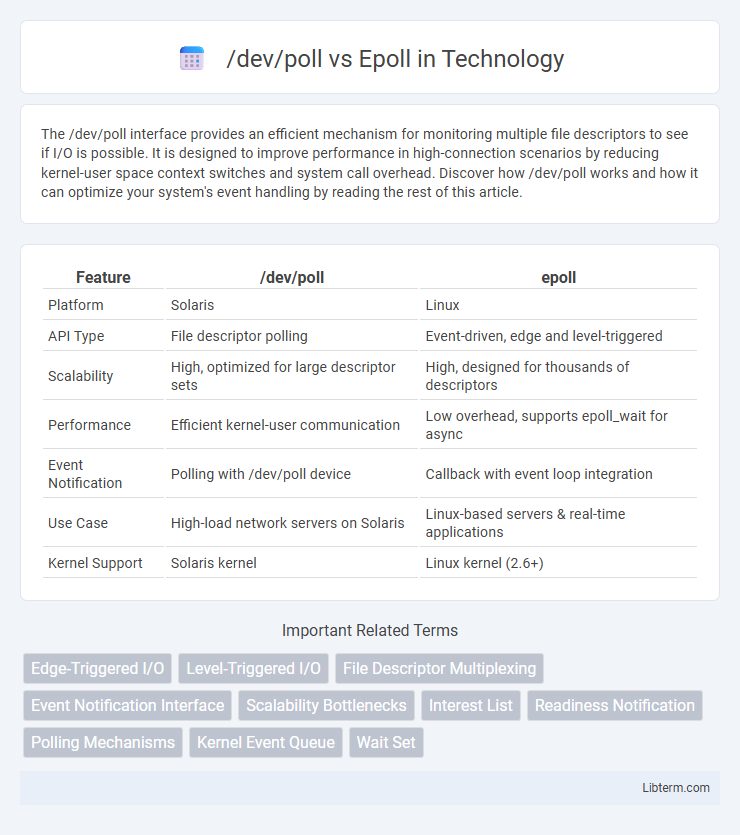The /dev/poll interface provides an efficient mechanism for monitoring multiple file descriptors to see if I/O is possible. It is designed to improve performance in high-connection scenarios by reducing kernel-user space context switches and system call overhead. Discover how /dev/poll works and how it can optimize your system's event handling by reading the rest of this article.
Table of Comparison
| Feature | /dev/poll | epoll |
|---|---|---|
| Platform | Solaris | Linux |
| API Type | File descriptor polling | Event-driven, edge and level-triggered |
| Scalability | High, optimized for large descriptor sets | High, designed for thousands of descriptors |
| Performance | Efficient kernel-user communication | Low overhead, supports epoll_wait for async |
| Event Notification | Polling with /dev/poll device | Callback with event loop integration |
| Use Case | High-load network servers on Solaris | Linux-based servers & real-time applications |
| Kernel Support | Solaris kernel | Linux kernel (2.6+) |
Introduction to Event Polling Mechanisms
/dev/poll and epoll are advanced event polling mechanisms designed to efficiently handle large numbers of file descriptors in Unix-like operating systems. /dev/poll, primarily used in Solaris, offers a scalable I/O event notification interface by allowing batch event registration and retrieval, reducing the overhead associated with traditional polling methods. Epoll, available in Linux, provides a highly efficient edge-triggered or level-triggered event notification system optimized for scalable network applications, minimizing latency and system calls during I/O multiplexing.
What is /dev/poll?
/dev/poll is a scalable event notification mechanism used primarily in Solaris operating systems to efficiently monitor multiple file descriptors for I/O readiness, reducing the overhead compared to traditional polling methods. Unlike epoll, which is specific to Linux, /dev/poll offers kernel-level event polling by maintaining an event queue that processes file descriptor changes without repeated user-kernel context switches. This approach enables high-performance I/O multiplexing suitable for applications with numerous concurrent network connections.
What is Epoll?
Epoll is an I/O event notification facility in the Linux kernel designed to efficiently handle large numbers of file descriptors by monitoring multiple streams concurrently. Unlike /dev/poll, which is primarily available in Solaris systems and uses a device file interface for event polling, epoll offers edge-triggered and level-triggered event notification methods, improving scalability and performance in high-load server environments. Epoll's design reduces overhead by providing a user-space API that minimizes context switches and system calls during event processing.
Architecture Comparison: /dev/poll vs Epoll
/dev/poll and Epoll are scalable I/O event notification mechanisms used in Unix-like operating systems, with /dev/poll primarily found in Solaris and Epoll in Linux. /dev/poll uses a file descriptor interface to monitor multiple file descriptors with kernel-level polling, providing efficient event retrieval by reducing user-kernel space transitions. Epoll employs an edge-triggered or level-triggered mechanism with an event-driven architecture that supports thousands of file descriptors, leveraging an internal red-black tree for file descriptor management, enabling higher scalability and lower latency under heavy loads.
Performance and Scalability Differences
/dev/poll offers improved performance over traditional select and poll by reducing overhead through kernel-assisted event notification, particularly beneficial on Solaris systems with large file descriptor sets. Epoll excels in Linux environments by providing scalable event handling with efficient O(1) complexity for large numbers of file descriptors, minimizing CPU usage and context switches. While both enhance scalability over older mechanisms, epoll typically outperforms /dev/poll in high-concurrency scenarios due to superior edge-triggered event management and reduced system call overhead.
Resource Utilization: Memory and CPU
/dev/poll offers efficient scalability for large numbers of file descriptors by batching events and reducing system calls, resulting in lower CPU usage compared to epoll under moderate loads. Epoll provides edge-triggered and level-triggered notifications with more fine-grained control but can consume higher CPU resources due to frequent event polling and context switches. Memory consumption in /dev/poll is generally lower as it maintains a fixed buffer for events, whereas epoll allocates dynamic data structures that may increase memory overhead in highly dynamic environments.
Programming Interface and Usability
/dev/poll provides a simple programming interface by allowing event polling through a file descriptor representing multiple monitored descriptors, offering a straightforward mechanism for scalable I/O event notification primarily on Solaris systems. Epoll, designed for Linux, uses separate system calls like epoll_create, epoll_ctl, and epoll_wait, enabling more fine-grained control over event registration and efficient edge-triggered or level-triggered notifications. Epoll's interface is more flexible and widely supported, making it generally preferred for high-performance network applications requiring extensive scalability and efficient event management.
Platform Support: Availability and Limitations
/dev/poll is primarily available on Solaris and its derivatives, offering efficient event polling by minimizing system call overhead but lacks support on Linux and most other UNIX-like systems. Epoll is native to the Linux kernel, designed for scalable I/O event notification with broad support in Linux distributions but is not available on Solaris or BSD variants. Each system call's platform-specific availability impacts application portability, with /dev/poll optimized for Solaris environments and epoll favored in Linux-based systems.
Use Cases and Industry Applications
/dev/poll is optimized for Solaris systems, providing scalable I/O event notification primarily in high-performance telecom and financial trading applications requiring low-latency network communication. Epoll, native to Linux, excels in large-scale web servers, real-time data processing, and microservices architectures due to its efficient handling of thousands of simultaneous file descriptors. Both mechanisms enhance event-driven programming but are chosen based on OS environment and workload demands, with /dev/poll favored in Solaris-based infrastructures and epoll dominating Linux-based cloud and container deployments.
Choosing Between /dev/poll and Epoll
Choosing between /dev/poll and Epoll depends on the specific workload and operating system environment. Epoll, available on Linux, excels in managing large numbers of file descriptors with efficient event notification and scalability, making it ideal for high-performance, real-time applications. /dev/poll, primarily used in Solaris, offers a similar scalable event handling mechanism but is optimized for that platform, so selecting between them hinges on the target OS and the application's concurrency demands.
/dev/poll Infographic

 libterm.com
libterm.com